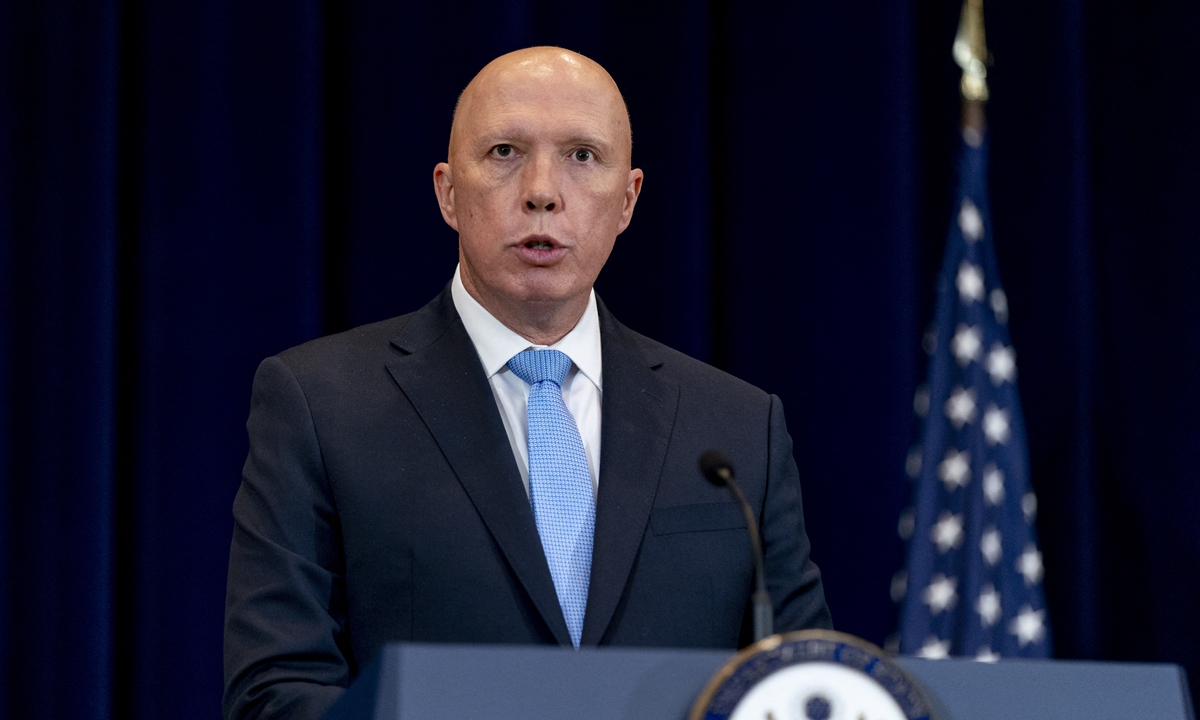2022年3月7日,华东师范大学澳大利亚研究中心主任陈弘接受《环球时报》英文版采访,谈澳大利亚总理莫里森和防长达顿借俄乌危机干涉台海事务。

Australian Defense Minister Peter Dutton Photo: AFP
In an interview with the Australian Broadcasting Corporation's (ABC) Insiders on Sunday, Australian Defense Minister Peter Dutton didn't repeat his previous remarks that Australia would join the US to defend the island of Taiwan. Instead, he indicated Australia may send weapons to the island in response to military conflicts in the Taiwan Straits, according to the ABC.
To some Australian media that wants to see constant frictions between Australia and China, Dutton's latest statement was "in a major softening of his language on China." But Chinese experts have a different view.
Dutton has by no means "softened" his stance, but specified the measures Australia will take. However, in whatever way, Canberra's intervention in the Taiwan question will be groundless.
Australian Prime Minister Scott Morrison and Dutton recently linked the Ukraine crisis with the Taiwan question, deliberately equalizing the two different affairs with ulterior motives, Chen Hong, a professor and director of the Australian Studies Center at East China Normal University, told the Global Times.
Song Zhongping, a Chinese military expert and TV commentator, told the Global Times that Australia offering the island of Taiwan weapons during war time will be a serious provocation against China and a harsh intervention in China's domestic affairs.
"If a certain country wants [to utilize the Taiwan question] to make a fuss, it will backfire. Be it sending troops or shipping weapons, they will be the moves with the same aim to hinder China's great reunification cause and to violate the one-China principle," Song said. He also warned that any country with such moves will be the enemy of the Chinese People's Liberation Army.
In November 2021 when Dutton spoke tough on the Taiwan question, he talked about "security." While on Sunday, he repeated "national interest." With such key words as excuses, the current Australian administration has emphasized its presence in surrounding regions to increase the country's regional and global strategic importance.
Australia is a middle power, but Canberra is far from satisfied with its limited geopolitical status. Australia has followed the US on many issues in a bid to improve its so-called international influence. As the election is not far away, Dutton's recent remarks were obviously driven by the intent to gain more political weight.
Some people say Dutton may be partly trying to create an exit for Australia in terms of its previous "promises" toward the island of Taiwan, so that Australia's image won't be damaged too much when it breaks the vow in the future.
Chen said this point of view made sense but he doesn't think the Australian administration is that wise. "In the past few years, it has done many things that hurt others as well as Australia itself. It may not have considered the issue thoroughly. Australia is blindly following the US even if it gets hurt, and it rushes ahead when the US says anything," Chen said.
The Morrison administration has been maneuvering "national interest." But it won't bring any good to the country as Canberra loses itself in overreaching. According to Chen, Australia's economy, population and military strength aren't enough to sustain the country playing a role of military power - let alone support its intervention in others. "Some extreme rightists are leading Australia to a dangerous path. And the consequences will be beyond what Canberra can afford," he noted.
Song said Australia should have a sober head that its national security is only about itself. If Australia insists on defining its national security as maintaining the US' hegemony and expanding the extension of security infinitely, it will be like drinking poison to quench its thirst.
At the same time, Song lamented, the island of Taiwan's authorities will still fail to see through the West's real intent in its manipulation of the Taiwan question. It is regrettable to see the Democratic Progressive Party authority solicit support from outsiders to resist reunification. Song indicated such an approach will only push the island to a dead end. There is no outside savior for Taiwan - only by adhering to the 1992 Consensus and the one-China principle will the island have its future.